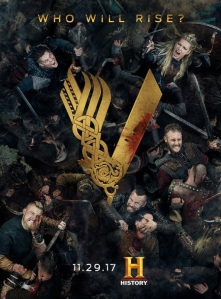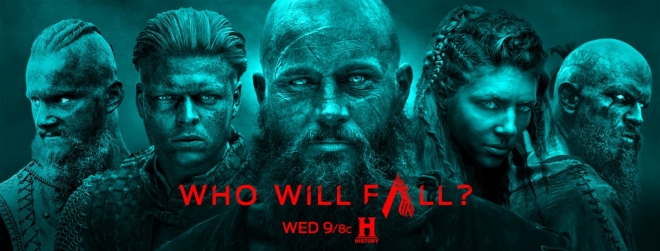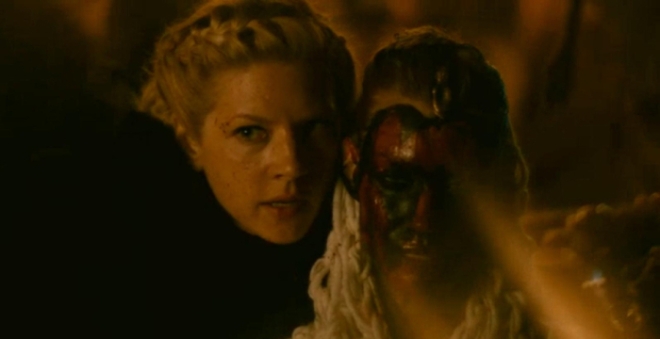OK, so season 5.1 of Vikings has wrapped up, with the sort of radical narrative centrelessness that we’ve come to expect from this sprawling music video of a show.
When last we left our heroes, everyone was wandering all over the map, with Ivarr and Hvitserk in York, Bjorn and Halfdan sailing around the Mediterranean falling in love, Ubbe and Lagertha being uneasy allies in Kattegat, Floki off colonising Iceland, and Harald wooing Astrid in Norway. I might have that all mixed up.
Aaaaanyway, everyone falls into one side or another of a big alliance, and Bjorn and Halfdan return, replacing their totally pointless Mediterranean side trip with an equally pointless romance between Bjorn and Princess Who Cares (Dagny Backer Johnsen). Spurned, Torvi gets together with Ubbe, which upsets Margrethe, who is sort of trying to do for Aslaug what Ubbe does for Ragnar, i.e. be the Poundland version.
And I guess Aethelwulf dies and Alfred is nominated king instead of Aethelred, which doesn’t make a lot of sense, but then I gave up trying to figure out this show’s approach to West Saxon history long ago.
So the two sides get together for a big season-ending battle, with occasional cuts away to the side plots in England and Iceland. The battle begins with a rousing chorus of The Only Song in Norway, but I can’t hate: the sad singing bit is effectively done, especially since I think the song ends on the line about killing lots of people.
So there is a battle: on the one side, we have Ivarr, Hvitserk, Harald, and Astrid, plus a bunch of Franks, while on the other side we have (deep breath), Lagertha, Torvi, Bjorn, Ubbe, Heahmund of all people, Snaefrid (that’s Princess Who Cares), Guthrum, and Halfdan. Throughout the battle, everyone takes little breaks to have moments of personal recognition and totally trip balls. During the battle, the following people die:
- Halfdan, having narrowly avoided confessing his love for Bjorn and thereby concluding his lifelong pattern of being witty and fun but not actually mattering or doing anything.
- Guthrum, who has pulled off the doing nothing and not mattering without the being clever. In fact, I’m totally baffled about why he was in this show in the first place if he’s not going to grow up to be, you know, Guthrum.
- Snaefrid. We hardly knew ye. No, literally. Also her dad, king of the
EwoksSaami. - Astrid, who, in a startling moment of gender equality is a woman who gets stabbed to motivate both a male and a female character! I’ll miss you, Josefin Asplund, and the only expression you got to use this season, Totally Miserable.
- No one who actually matters.
- Seriously, not even Hvitserk.
- Honestly, someone’s going to leave a comment below telling me that And Hvitserk Too died but I just forgot about it, and I’ll believe them. Poor old fluffy-lipped Hvitserk; it’s not his fault. He just wants to be liked while being totally unlikable. Is that so much to ask?
Meanwhile, back in Iceland, the Best Plot is unfolding, because Floki somehow assumed that people super devoted to Norse gods would be a peaceful community united in shared beliefs instead of like the Revenge Killings Fan Club. He has a great speech where he predicts an ever-escalating cycle of feud and murder, or, as I like to think of it, Iceland.
And in England Judith goes all Lady Macbeth, which would matter more if we gave a hoot in heck about Aethelred.
And to wrap it up, Rollo is sailing into Kattegat in a move that makes no historical sense but warms my heart because I like to see Clive Standen as the big meathead doofus who outplayed them all, and because I do like to see the Normans do well. It reinforces one of my favourite themes in media / least favourite themes in real life, You Can’t Fight City Hall.

There are points in this show where you want to shout at the screen yes, I get it, I’ve seen Valhalla Rising too, I get it!
Sure looks nice, though!






